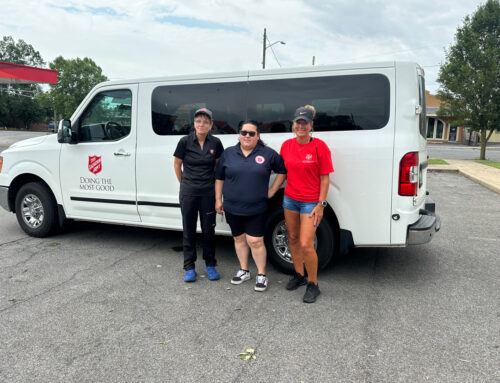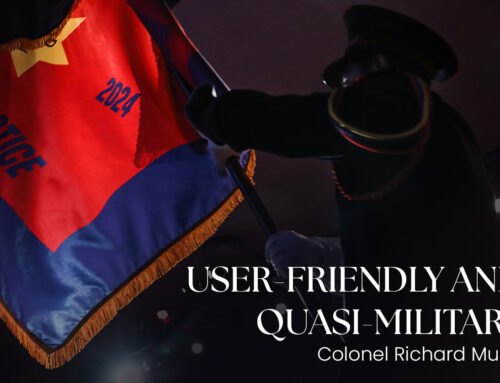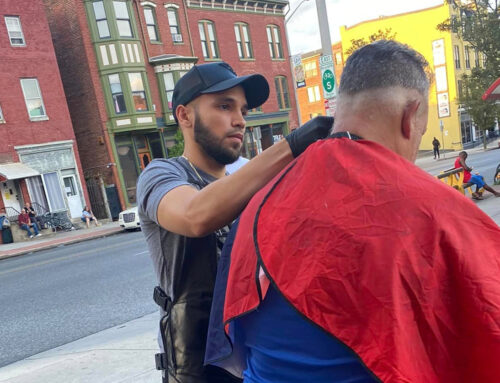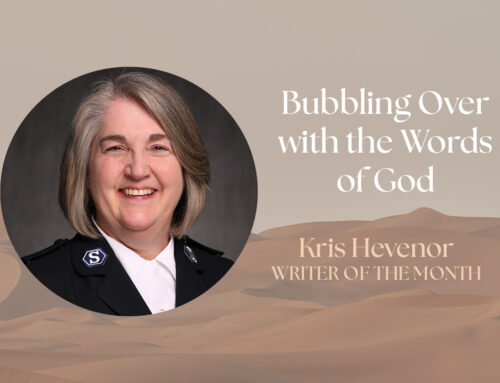Meeting the Needle
by Hugo Bravo
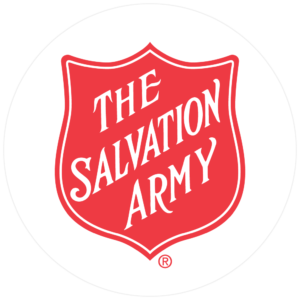
Meeting the Needle
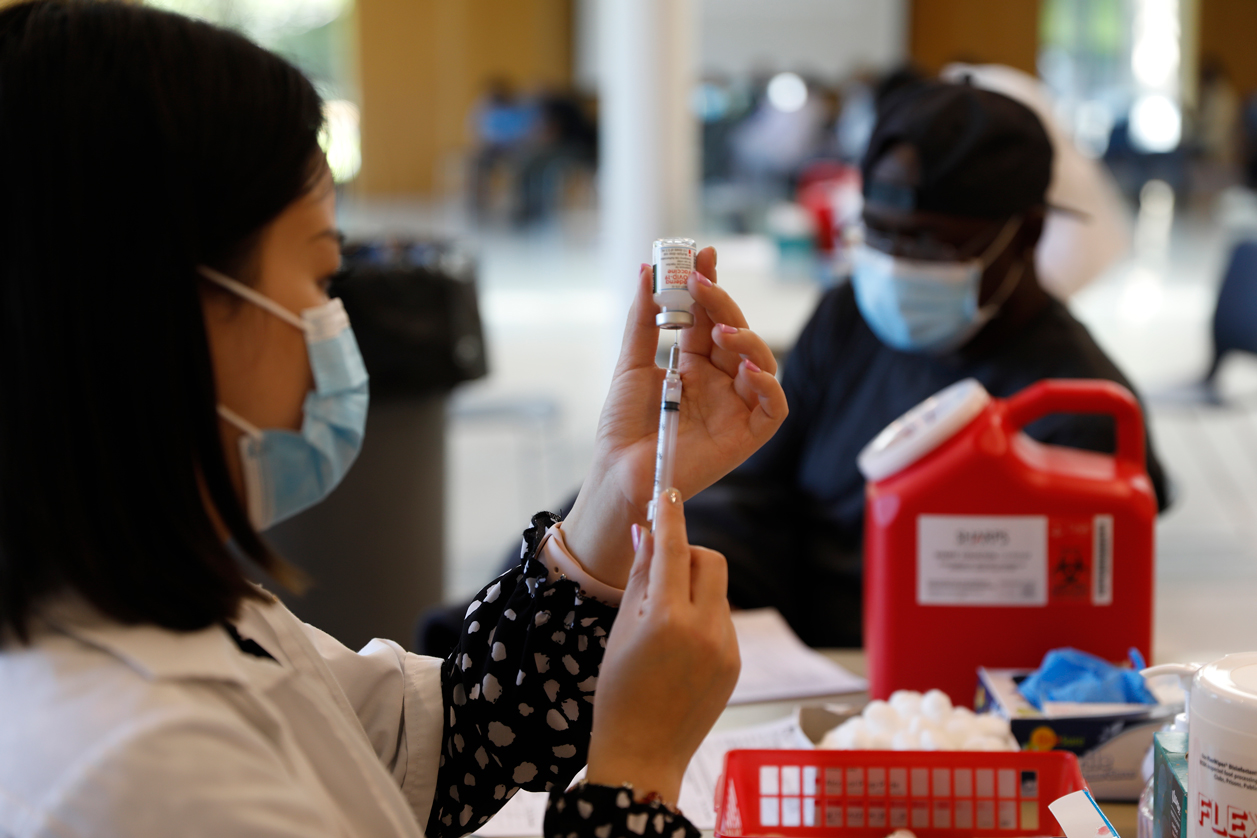
When news broke last March that the Salvation Army’s Philadelphia West Corps would host a vaccine clinic, the community response was enthusiastic.
“Our phone was ringing off the hook to make appointments, but we had to direct them to the health department. They were the ones setting everything up. We were only providing the location,” says Major Celestin Nkounkou, pastor at the Philadelphia West Corps.
Nkounkou and members of the church worked with the local fire department to administer the Johnson & Johnson vaccine. The first vaccinations were by appointment only, and on average, 400 people were vaccinated weekly.
“We have a large gymnasium, and [our] location is good for this type of work,” says Nkounkou. He sees the clinics as another way The Salvation Army meets human need without discrimination.
“This was a good ministry program, and we’re always open to doing it again, if they ask us,” says Nkounkou, who was also vaccinated in his gymnasium.
In 2021, the United States received its most powerful weapon against the COVID–19 pandemic in the form of three different vaccines, all proven to prevent the effects of the viral infection and its potential to cause death. As these vaccines became more accessible to the public, Salvation Army facilities managers across the country opened their doors to health officials and hosted vaccine clinics. As a trusted institution in the community, many Salvation Army church leaders encouraged parishioners to get educated about the COVID–19 vaccines, and then provided a safe haven to get vaccinated.
The Salvation Army’s Ray & Joan Kroc Community Centers, with their diverse membership and spacious facilities, have been key locations for these clinics. In Camden, N.J., the Kroc Center teamed up with Cooper University Hospital to administer COVID–19 vaccines to the public three days a week inside the newly renovated gym.
“Our gym is now sacred,” says Captain Keith Maynor, administrator at the Camden Kroc Center. “Its purpose was transformed to being a host for science and God’s love.”
The Camden Kroc’s involvement helped bring down two major barriers that were preventing the community from getting vaccinated; a lack of trust in vaccines among the city’s African American and Latino population, and a lack of transportation to take residents to get the vaccine.
“This was where we came in,” says Maynor. “The Kroc Center is trusted in the community; we bring credibility because of who we are. We’re also located at an easy point for people to come and get vaccinated.”
The Camden Kroc Center hosted town hall meetings on social media outlets with African American and Latino doctors. In live Q&A sessions, viewers from the community asked questions about the vaccine and the science behind it.
“The Church can play a critical role in erasing fears of getting vaccinated,” says Benjamin Ovadia, community relations and development director at the center. “When someone sees medical professionals who look like them and speak their language, they understand that the vaccine is safe.”
Maynor said, “Through the Lord, we were able to be a bridge of hope from provider to patient. It has been a profound blessing to be a safe, trusted space for people to come and get vaccinated.”
The Philadelphia Kroc Center’s Wells Fargo Conference Room, which had been expanded in January of 2020 to fit 300 people, was used to administer vaccines in a socially–distanced environment.
“Being a community vaccination site wasn’t in anyone’s mind when we did the dedication for the room, but God knew that this was what its true purpose would soon be,” says Major Tawny Cowen–Zanders, divisional secretary for The Salvation Army in Greater Philadelphia.
Major Kevin Zanders, the center’s administrator, said, “I had never seen a line of people [waiting] to get into the Kroc Center as I did that first day of vaccines.” He stood at the front desk, welcomed guests, and monitored their temperatures.
“This follows the model of meeting people’s needs in mind, body, and spirit,” says Major Kevin. “The relief people felt after getting the vaccine helped them mentally. The vaccine helped them physically. When they also know that the vaccine is given with God’s love, that helps them spiritually.”
“William Booth [Founder of The Salvation Army] once said that the Army is a place of hope. When every other light is extinguished, and every other star has gone out, we are to be the gleam that shines steadily and clearly in a darkened sky,” said Major Tawny. “I thought about that, and how desperate people are to get back to some normalcy in their lives. When they came to us, they knew that their life was going to change. They were going to be taken care of, in the name of Jesus.”
On the day of the first vaccinations at the Salvation Army’s East Cleveland Corps vaccine clinic, 75 corps volunteers were on hand to help. Health department and fire department EMT personnel were ready to assist anyone who may have had a negative reaction to the shot, though everyone was OK. Volunteers and church workers were prepared with dividers, water, and snacks, and even prayer and spiritual outreach.
“The city knew how the corps operates, and that we have the space and staff to host 300 or more people looking to get Moderna vaccines. We were asked, and immediately, we said yes,” says Major Brian Glasco, corps officer at East Cleveland.
“After the first day, we regrouped to see what we did right and what could be improved,” says Glasco. “I think that when everyone here got over the fear of being so accessible in a health setting, we dove right into the work. We had an easier time when folks came back for their second shot a few weeks later.”
The East Cleveland Corps hosted two more clinics for Pfizer and Johnson & Johnson vaccines in May and June.
“Our vaccine clinic happened to fit right in with the work of Christ; it was the simple dynamics of a biblical stature,” says Glasco. “We asked ourselves what Jesus would do. The answer was that He’d be here, healing others.”
Rather than host a clinic, the Salvation Army’s Meriden, Conn., Corps Community Center created a whole new outreach ministry in the fight against COVID–19. The hope was that by putting the correct, science–based information into people’s minds, it would lead to more shots into their arms.
“From talking to people in our soup kitchen, we learned that there were two kinds of personal views on the vaccine,” says Lieutenant Kate Borrero, pastor at Meriden. “The first group were people completely on board with the vaccine and who had gotten it as soon as they could. The second group were people who were apprehensive because a friend had told them something negative about the vaccine that they had read on the internet.”
That second group had to be reached. The Meriden Corps leaders educated their staff with information from the CDC, which included responses to common vaccine myths, and a list of ingredients found in the COVID–19 shot. Corps personnel set up a table at a weekly farmers’ market that is frequented by the community and invited them to join discussion groups implemented through games, trivia, and prizes.
“One of the games we play is to ask a contestant to name an ingredient in the vaccine to win a prize. They are surprised to learn that some of the ingredients can be found in their home right now, such as salt water and sugar,” said Borrero. “When they hear this, it opens the conversation more.
“We also learned that most people do want to be educated and try to do their research, but they don’t have access to concrete truths. They instead do deep dives into random social media posts.”
Borrero says that the success of their information ministry goes back to 1885, when The Salvation Army arrived in Meriden.
“We have been here for so long that the community knows they can trust us and come to us for what they need. The Salvation Army adds a different type of credibility that maybe a government agency would not have,” says Borrero.

